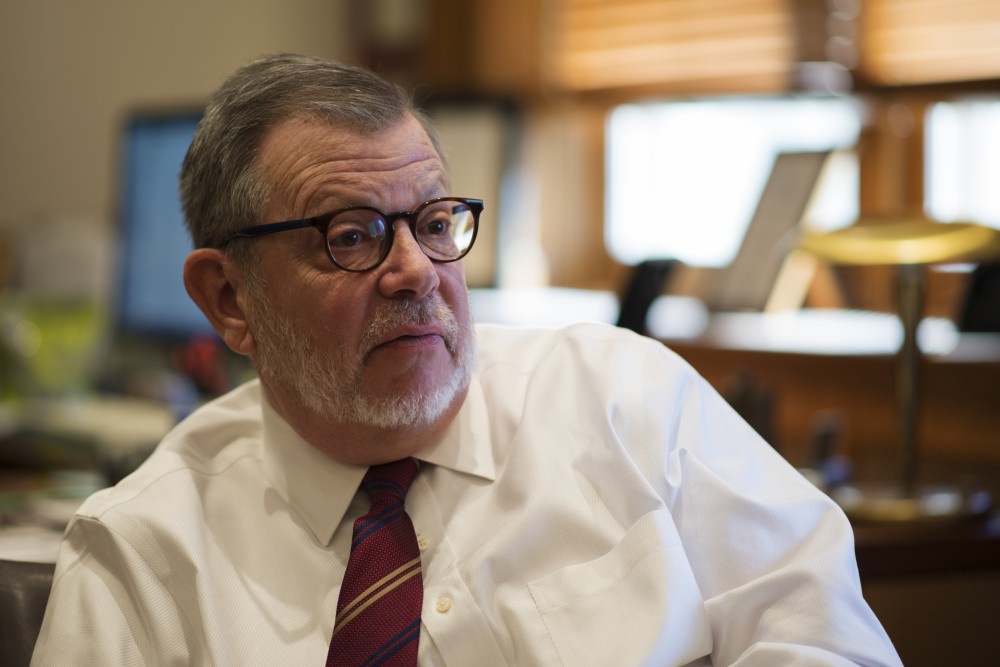The Minnesota Daily sat down with University of Minnesota President Eric Kaler on Friday to talk about the recent midterm elections, the enforcement of a hard-alcohol ban for fraternities and changes in University leadership.
Thanksgiving is approaching, do you have any fun plans?
We are actually going to go on a University trip to China for the better part of two weeks. So we will spend Thanksgiving in Shanghai with about 250 Chinese alums of American universities, of which about 25 or 30 will be Minnesota [graduates]. So we’re going to have classic Thanksgiving dinner in China.
The midterm elections took place earlier this month, and there was high voter turnout throughout Minneapolis, including student-dense areas. What are your thoughts on this?
I’m excited by that. I think that’s exactly what everybody hopes — is that this is a democracy governed by its citizens, and that the way that democracy is expressed is through voting. It’s not more complicated than that. So ideally, everyone should vote and I’m always encouraged by high turnout.
The North American Interfraternity Conference banned hard alcohol and University fraternities are implementing it almost a year early. Since the ban, some fraternities are still unsure how to implement it. What is the University doing to ensure that the ban is enforced?
Well, there are limited things we can do to actually ensure that it’s enforced. But we certainly can help the IFC identify vendors and best practices so that they are able to hold true to their goal of having no hard alcohol. And when they do, to have it served by a vendor who is charged with checking IDs and also ensuring that nobody is served too much.
You recently announced that Executive Vice President and Provost Karen Hanson will remain at the University after a leave of absence instead of stepping down at the end of the year like originally announced. What led to this change of plans and how will this provide continuity during the shift in leadership?
… As we move through a transition at the presidential level, it was really important to have continuity in the provost’s office. The provost is balancing her personal life obligations and commitments to her obligations and commitments to the University. And so as she preceded through sorting out those options, it became more clear that going away for a three-month leave would satisfy those family obligations while allowing her to return and be the continuity through the presidential transition, which I think is a wonderful outcome for the University.
Christopher Cramer was recently named the new vice president of research. What does he bring to the table?
He brings enormous creativity, great imagery, great experience as a researcher. He’s a very distinguished chemistry researcher, and also good administrative experience as an associate dean in the College of Science and Engineering. So he understands the processes that need to be in place to enable our researchers to be successful, and I think he will have a very successful time in that office.
Following the vandalism of the College Republicans bridge panel, students held a march across the Washington Avenue bridge for transgender rights and visibility. What is your response to these events?
… We do not tolerate vandalism … It’s remarkable that anybody would think that vandalizing somebody’s expression of free speech can possibly advance whatever it is you believe in. I’ve said any number of times that the best way fight speech you disagree with is through more speech. It’s not with vandalizing a sign, it’s not with heckling a speaker, it’s with articulating your own points of view with a clear and compelling way so that people understand why your way of seeing the world is better than somebody else’s — and spray painting over somebody’s sign is the opposite of smart.
DACA is likely headed to the Supreme Court where some experts said it will likely be phased out. You have repeatedly reiterated your concern over the program’s end and support for students and their families. How will the University continue to support these students when there is uncertainty over the future of the program?
Well, we will support them as we have been supporting them until the Supreme Court rules. And it is not clear to me, frankly, which way the Supreme Court will go. I think there are compelling arguments in support of DACA, but again, this is why we have a Supreme Court, so we can adjudicate these issues.
On Oct. 1, the [University] filed a petition to opt out of paying into the Conservation Improvement Program. Shortly after, the University announced it would remain a part of the program. Why did the University reverse its decision?
… Again, we saw that as an opportunity to retain some of our resources to do conservation work within the boundaries of the University of Minnesota. But as we began to do that, our partners in conservation and sustainability made it clear that they thought the University’s resources were more widely used in support of broader conservation efforts, which include the community … We realized … our efforts were more better served on pulling back our petition and engaging in more conversations with our partners in what the best use of those resources would be.
Finals are approaching, do you have any advice for the student body?
My advice this year is the same as it has been in years past. Maintain equilibrium, get help when you need it, take care of yourself and get enough to eat and get enough to sleep. And maintain balance in your life when you move through what is typically a stressful time.








